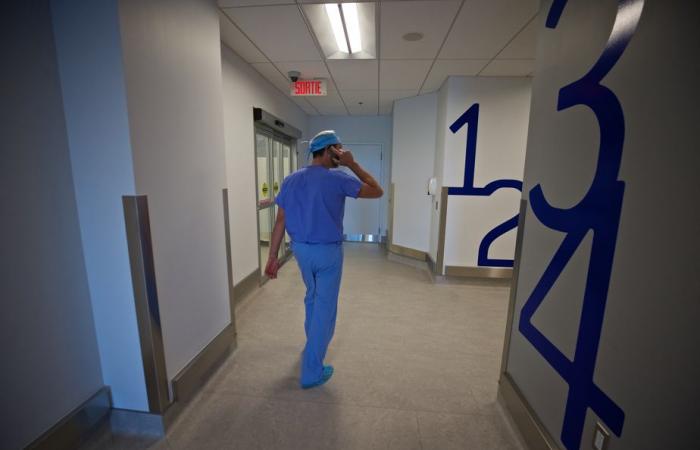Health Minister Christian Dubé asks the CIUSSS du Centre-Sud-de-l’Île-de-Montréal to reverse its decision to terminate two surgical contracts at the specialized medical center (CMS) Chirurgie DIX30.
Posted at 12:08 p.m.
Updated at 3:39 p.m.
The CIUSSS Centre-Sud-de-l’Île-de-Montréal notified Chirurgie DIX30 on Thursday that it intended to terminate, in 30 days, two contracts: one for ophthalmological surgeries and the other for various operations, such as knee and hip replacements, tubal ligation and hernia surgery.
According to DIX30, some 150 patients from the CIUSSS Centre-Sud-de-l’Île-de-Montréal are operated on each month in its facilities. The health establishment instead cites a monthly average of 91.
Health Minister Christian Dubé was quick to react. “In a context where too many Quebecers are still waiting to be operated on, we have requested that an intervention be made to the establishment to correct the situation,” indicated his office.
“Let’s be clear: there is no valid excuse for reducing services to the population,” we add. The surgery catch-up plan is a priority and managers must respect it within the framework of their budget. »
A decision denounced by the FMSQ
A little earlier Friday, the Federation of Specialist Physicians of Quebec (FMSQ) denounced the termination of these contracts, which “will reduce access to care”.
“Budgetary rigor is something. Budgetary rigor at the expense of patients is unacceptable and it will always be unacceptable for the FMSQ,” says its vice-president, Dr.r Serge Legault.
As of August 24, 5,500 patients were waiting for surgery at the CIUSSS Centre-Sud-de-l’Île-de-Montréal, including 2,166 in orthopedics, 1,000 in general surgery and 400 in obstetrics and gynecology, according to the Ministry of Health. Health and Social Services (MSSS).
CIUSSS reaction
According to the CIUSSS du Centre-Sud-de-l’Île-de-Montréal, several reasons explain this decision to terminate the two contracts. Since the spring, its two hospitals (Notre-Dame and Verdun) have “increased their operating capacity,” which allows them to treat clients internally, “particularly with the increase in minor surgery capacity, including ‘ophthalmology. »
The number of surgeries carried out at DIX30 has therefore been “decreasing” in recent months, it is specified. The CIUSSS adds that many patients do not qualify to be operated on at DIX30, due to their comorbidities.
“The objective of using the CMS DIX30 was above all to reduce waiting lists for surgeries of more than 12 months,” says the CIUSSS. Currently, patients at our establishment who fall into this category represent only 5% of surgeries at CMS DIX30. »
The establishment adds that the “high cost” of bilateral ophthalmology surgery at DIX30 was “considered in the decision-making”. By terminating the contracts with 30 days’ notice, the CIUSSS was not exposed to any financial penalty.
A “cut in care” in orthopedics
According to the Dre Véronique Godbout, specialist in orthopedic surgery who practices at Notre-Dame hospital, operating time has not increased in the Notre-Dame and Verdun orthopedic operating theaters.
“Our lists continue to increase regularly,” says the Dre Godbout, also president of the Quebec Orthopedic Association. There is no shortage of cases available, ready to travel and who are medically eligible in CMS. »
The Dre Godbout believes that the cancellation of these contracts would result in a “cut in care” in his specialty. “We, in our center [Notre-Dame]we have not yet had a catch-up plan that has started,” she says. She specifies that operating rooms do not remain in operation longer in the evening to carry out more surgeries and thus reduce waiting lists.






